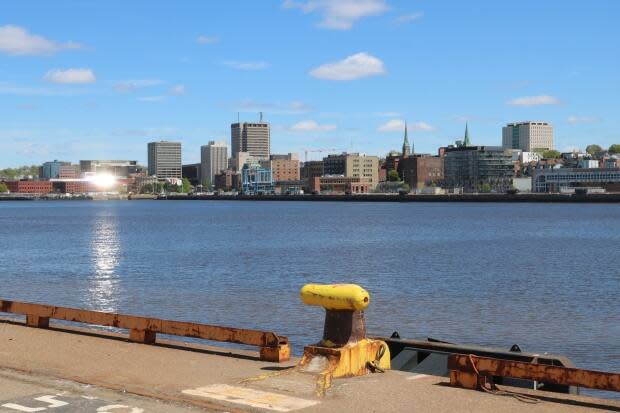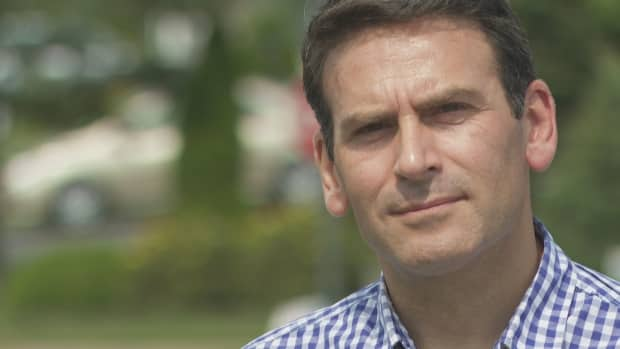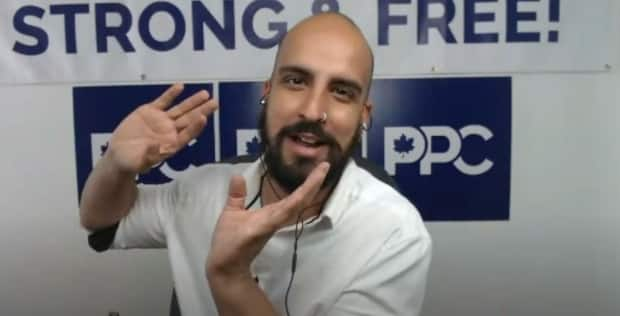Saint John-Rothesay candidates address big issues, climate change, housing

Saint John-Rothesay has historically been a riding to watch in New Brunswick, having both the highest poverty rates and the largest industrial businesses and carbon gas emitters.
Two-term Liberal MP Wayne Long is fighting to keep his seat, as former Saint John Mayor Mel Norton is trying to turn the riding Conservative.
Ann McAllister with the Green Party, Don Paulin with the NDP and Nicholas Pereira with the People's Party of Canada are also all vying for that seat in Ottawa.
With the election day approaching on Monday, here's every party candidate's stance on the important issues facing voters, as told by them in interviews with Information Morning Saint John throughout the past week:
Wayne Long
The path to a third term in Ottawa for Long is far from easy, according to polls and political commentators.
Long said he decided to re-offer because he wants to keep the party's momentum. He said he has brought more federal attention on the riding, including funding for a new NBCC trade school, for waterfront development and a $15 million federal investment at the Saint John Airport.
"I've got, you know, lots of things accomplished, but I got a lot more I want to do," he said.
Housing has been one of the biggest issues in the area, with a chronic shortage of affordable housing, according to advocates.
Long said the federal government's rapid housing initiative and other projects have been ongoing, and they need to continue to push forward with that.
Long said the Liberal government's affordable daycare program can help with making living more affordable and freeing up money for housing. This program would not come into effect unless the Liberals win the election, and sign an agreement with the province.
On climate change, Long repeated the party's vow to reduce carbon emissions by 45 per cent by 2030, and go to net zero by 2050.

When asked about his party's support for the Trans Mountain pipeline, and his support of the Energy East pipeline, Long said it's important to find balance between the economy and the environment.
"It's easy to sit back and shoot arrows when you're not governing or you don't have the responsibility of the mandate to govern all Canadians," he said.
"The cost of governing is making difficult decisions … You don't get everything right, but you try to govern. And we try to govern progressively."
Don Paulin
Thirty-year-old NDP candidate Don Paulin is a newcomer to politics. He's a student and health care worker, and is running in his first campaign.
Pauline said he's running because he's never heard any politicians advocate for people like him. He said he's drawing on his experience growing up in poverty so people like him "knew there are other options."
He said students have been neglected, and issues like a living wage, affordable housing and access to proper healthcare are ignored.
Saint John-Rothesay has historically been a Liberal or Conservative riding, and has not elected any third-party candidates. Paulin said he's not concerned about this history working against him, but is instead focused on doing the best he can.
"I'm going to make sure everyone is treated equally," he said.
On climate change, Paulin said he will no longer delay action. This includes "immediately" ending oil and gas subsidies, and using that money on social programs and electric car options.
He said to make up for the lost jobs for people who work for the Irving Oil refinery, for example, if elected, he plans to replace those jobs with electric-vehicle manufacturing.
Small-modular reactors are off the table, however, because it's "going to come too little, too late," he said.
On housing, Paulin said his party promises to build at least 500,000 net-zero affordable homes across Canada within 10 years. The party's policy also counts on cracking down on foreign investment that is increasing the cost of housing.
When asked where the money for this would come from, Paulin said the money already exists, it's just going to big banks, private airlines and fossil fuel companies.
"We will invest in people, not in corporate handouts," he said.
On reconciliation, he said his party will take the lead from Indigenous communities rather than set the rules.
"Allow them, the Indigenous people of our country, to tell us what we need to do as a society to fix and rectify."
Ann McAllister
Ann McAllister is no newcomer to politics. She's run for the Green Party four times before. She ran in the provincial riding of Rothesay in 2014, 2018 and 2020. This is her second time running for the federal seat of Saint John-Rothesay, the first being in 2019.
McAllister said she wants to push for renewable energy, raise public awareness that small modular nuclear reactors are not a climate solution, complete the social safety net, work for affordable housing, universal daycare, pharmacare, dental care and Medicare, and a guaranteed living income.
She said it seems like a lot, but "there's a lot we need to do … and we have tremendous potential in this community to do it."
McAllister said a Green government would institute a nation-wide efficiency retrofit of all buildings, which would bring thousands of jobs.
She said small modular nuclear reactors would be expensive to build and are coming "way too late."
On housing, McAllister said her party would end evictions during the pandemic, as well as for rental arrears or renovations, and would create a national rent arrears assistance program.
She said for the longer term, the party would build 350,000 affordable and supportive housing units over the next 10 years. She said building community businesses and reducing outsourcing would improve the cost of living.
McAllister said her party has been gaining support, with votes tripling for the Green party candidate in 2019.
"Granted, I'm partisan, but I believe that we do have the strongest policies for taking meaningful climate action and also for establishing the best standard of living for people by closing the gaps in the social safety net," she said.
Green Party Leader Annamie Paul's absence from the province and controversy around her leadership has not affected her campaign, McAllister said.
"Annamie's problems with the party leadership have not come up," she said.
Mel Norton
Mel Norton's name is recognized often because of his service as mayor of Saint John from 2012 to 2016. He ran unsuccessfully for the provincial Progressive Conservative leadership, and has now turned his attention to the federal Saint John-Rothesay seat,
Norton said he's running because he wants to make Saint John-Rothesay a seat of "national importance again."
He said biomedical research is an important opportunity for Saint John because it has universities and a large hospital. He said he will focus on growing this, as well as expanding the port of Saint John.

On healthcare, Norton said within the first 100 days of being elected, the party would meet with all of the premiers of the country and put in place a $60 billion funding program over the course of 10 years, which would increase health care budgets for New Brunswick by six per cent.
On housing, Norton said it's a crisis situation for young couples who are trying find a new home or just afford rent. He said if elected, the party is committed to building a million new homes over three years.
"We've committed to tying infrastructure funding that goes to cities like Saint John and towns like Rothesay to the development of new housing," he said.
He said to cool some of the housing market, "we will ban the practice of foreign investors buying homes and residential properties in Canada."
"Unless they live here, they can't buy it," he said.
It's not clear nor has it been categorically proven that foreign investors are a contributing factor to New Brunswick's increasing housing prices.
On climate, Norton said he believes climate change is real, and there's no question around the position of the party.
"It's clearly borne out by the science," he said.
He said the party plans to meet or exceed the Paris agreement to substantially reduce global greenhouse gas emissions, which he said the current government has missed. He said his party is aiming for a lower reduction target.
"We're going to meet our international obligations or exceed them, but we're not going to do it on the backs of hard working Canadians," he said. "We're not going to do it at the expense of the economy."
Nicholas Pereira
Nicholas Pereira is running for the People's Party of Canada for the first time.
He said he's running because when the pandemic and lockdowns started, he became interested in policy and speaking against lockdowns and vaccine mandates.
"I started noticing a much more move toward a big government, lots of funding from the government, lots of taxes, a very socialist type of policies," he said.
Pereira gave as examples the government's new gun-control policy and Bill C-10. which he said regulates "hate speech."
Bill C-10 in fact does not explicitly address or mention hate speech. It allows the Canadian Radio-television and Telecommunications Commission (CRTC) to regulate online-based media platforms such as YouTube. This applies to user-generated content, but only from people affiliated with the platform, not members of the public.

Pereira said he feels Canada had swung too far to the left and he wants to be the voice to bring "the other side of the story."
Over the course of the campaign, the People's Party of Canada has been criticized for inciting political violence and protests at hospitals from people who are against the COVID-19 vaccine.
Pereira said "the PPC does not condone any type of violence or screaming."
"We want to engage in debate, in conversation," he said.
Pereira is opposed to requiring immunization records or proof of vaccines because it "ushers in a 'Show me your papers' nation."
He said his party still wants to protect vulnerable people.
When asked how someone choosing not to get vaccinated and then going to work at a long term care home protects the most vulnerable, Pereira said "You've just given a hypothetical scenario, so I can't answer a hypothetical."

